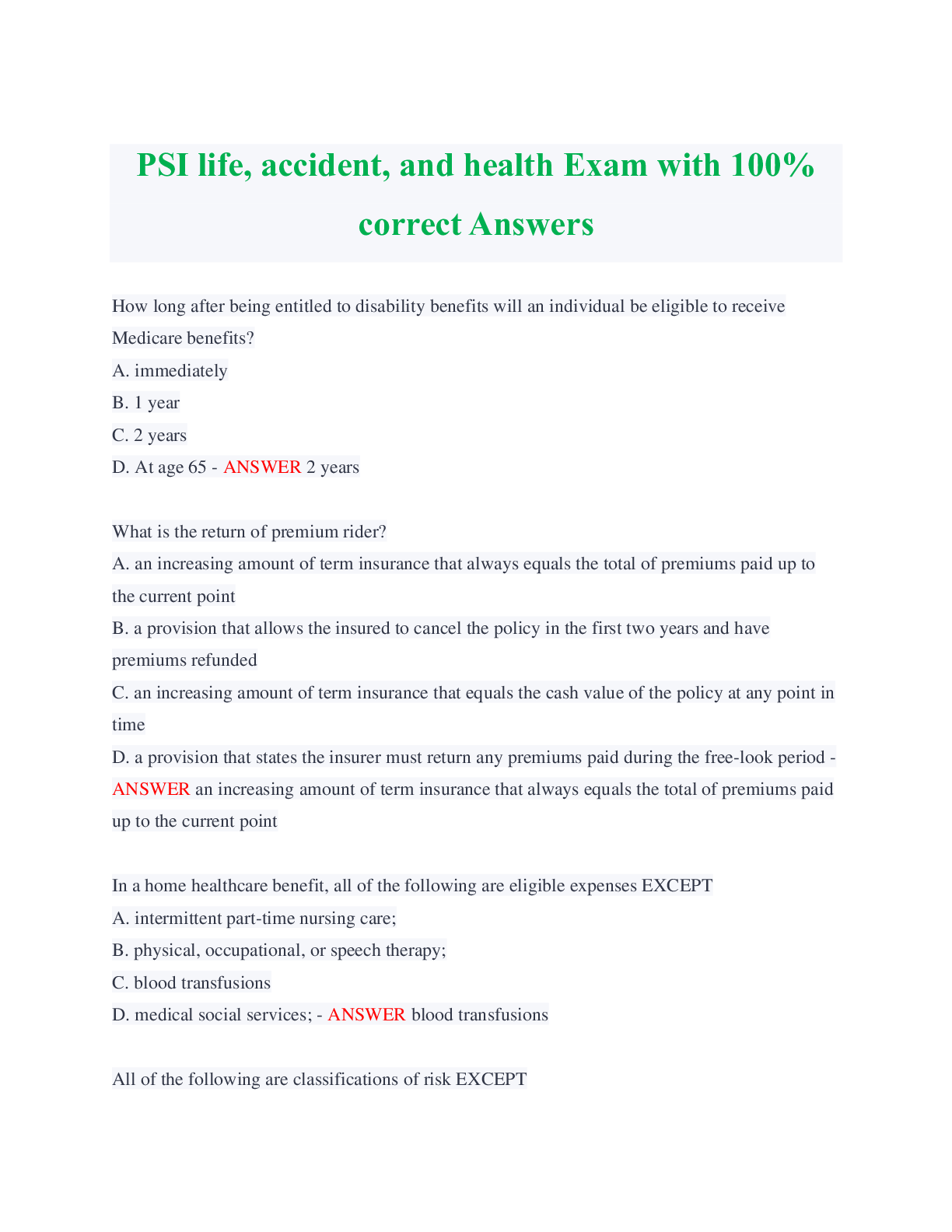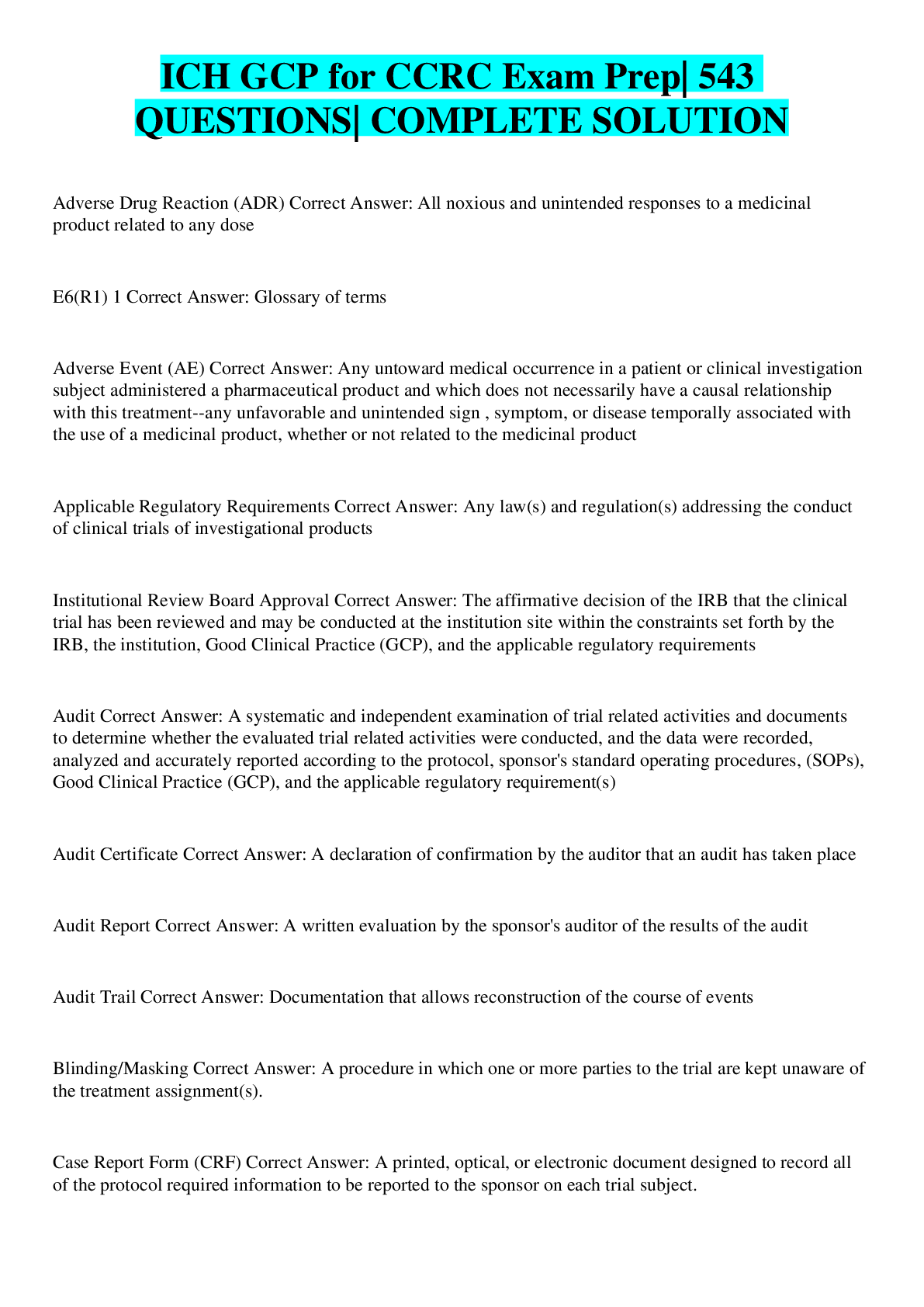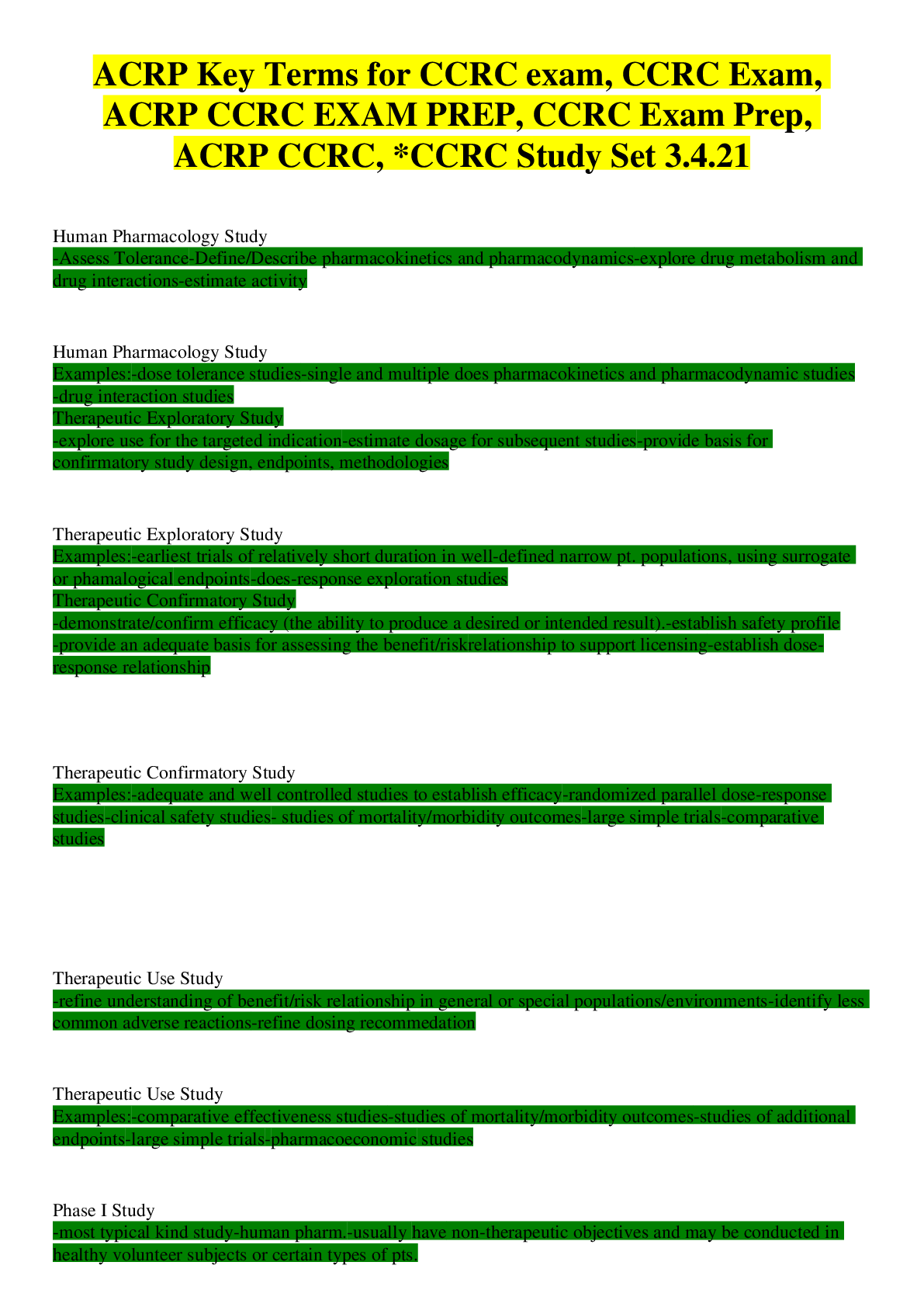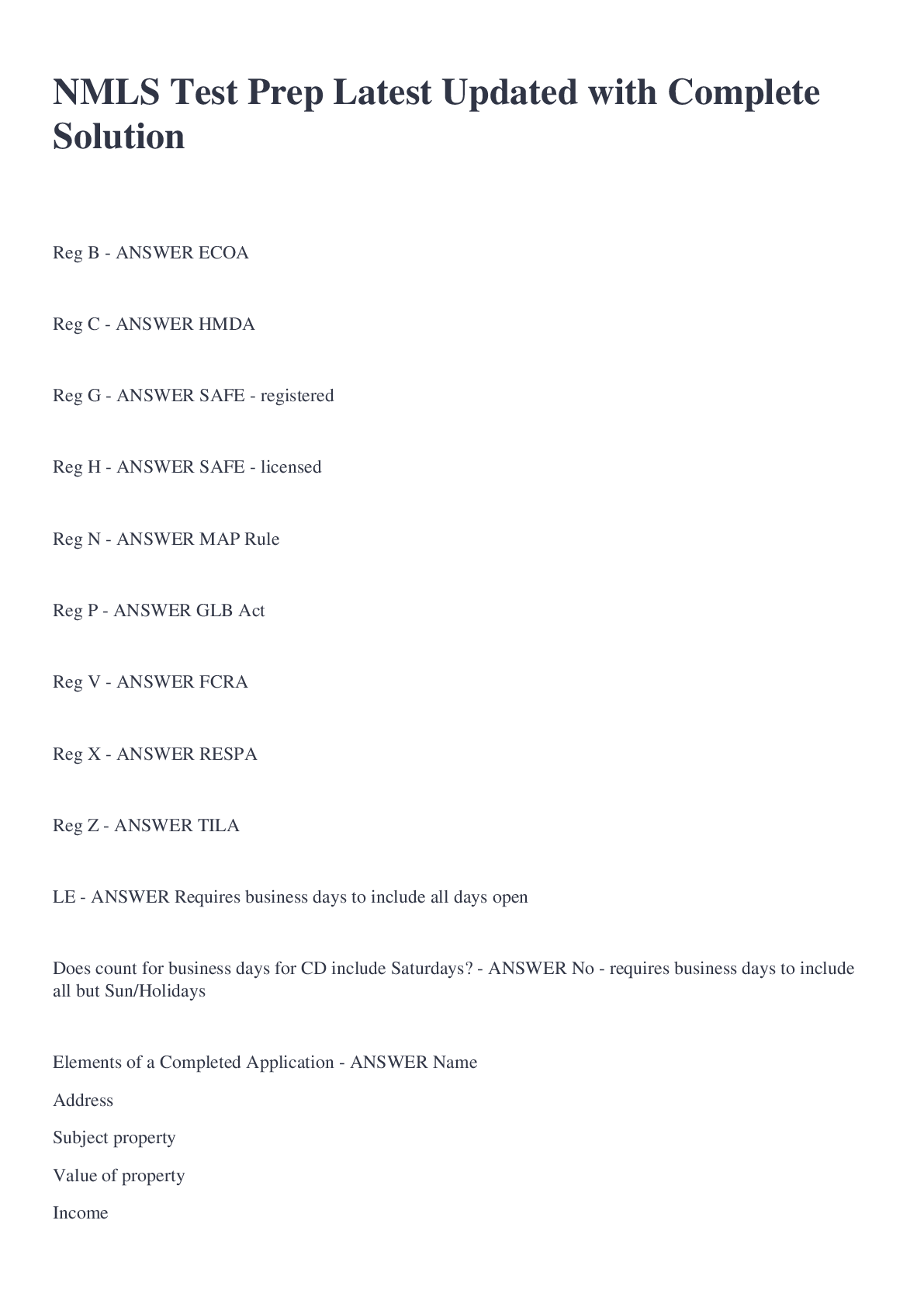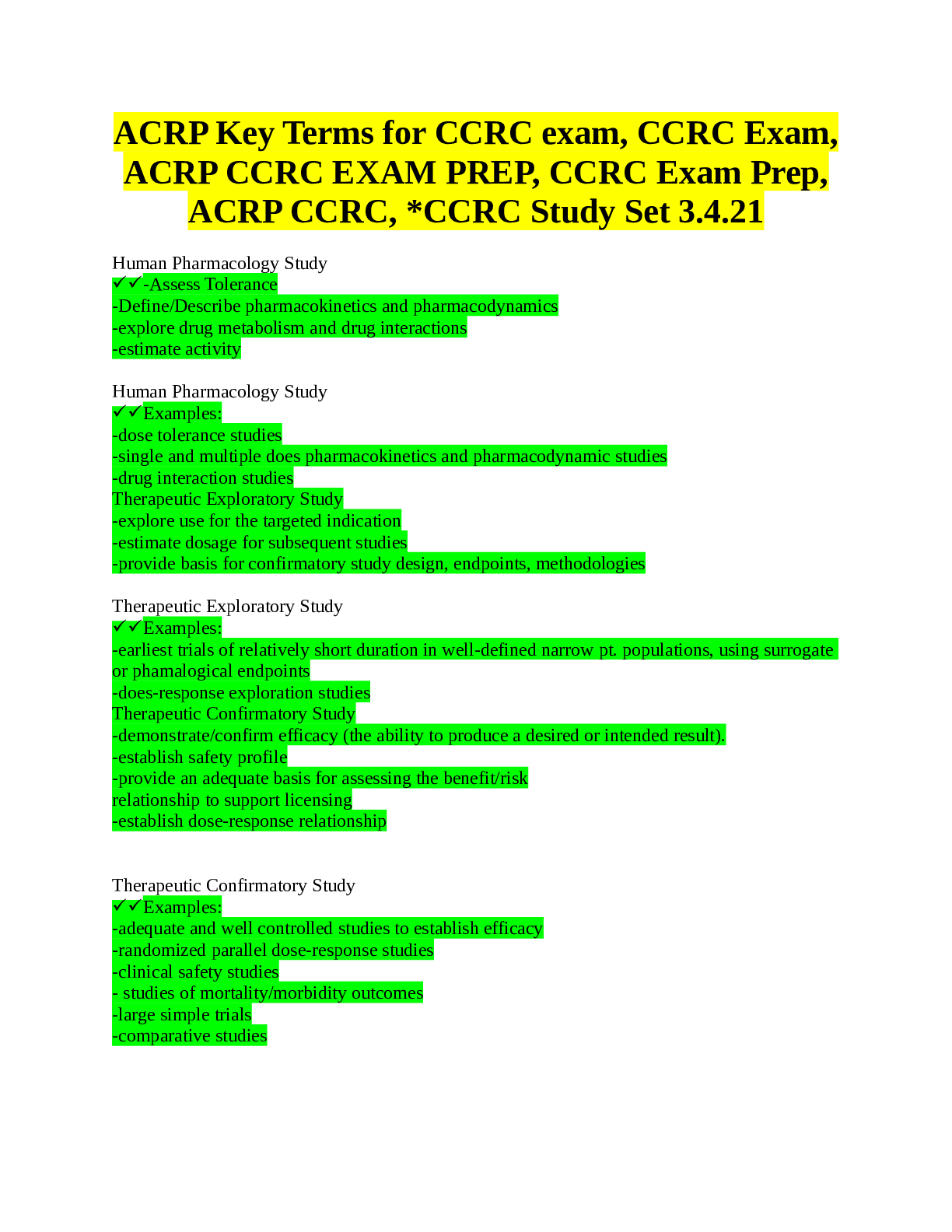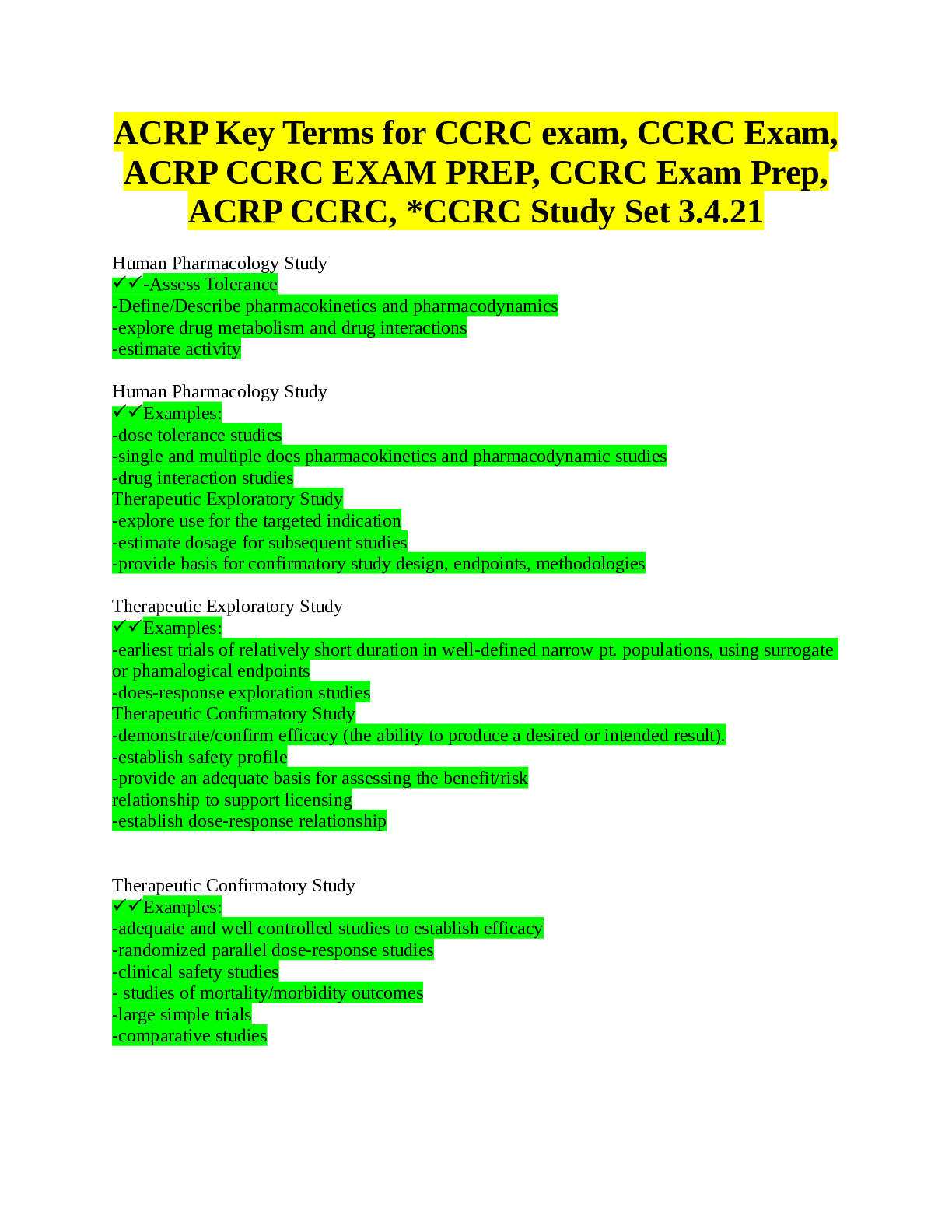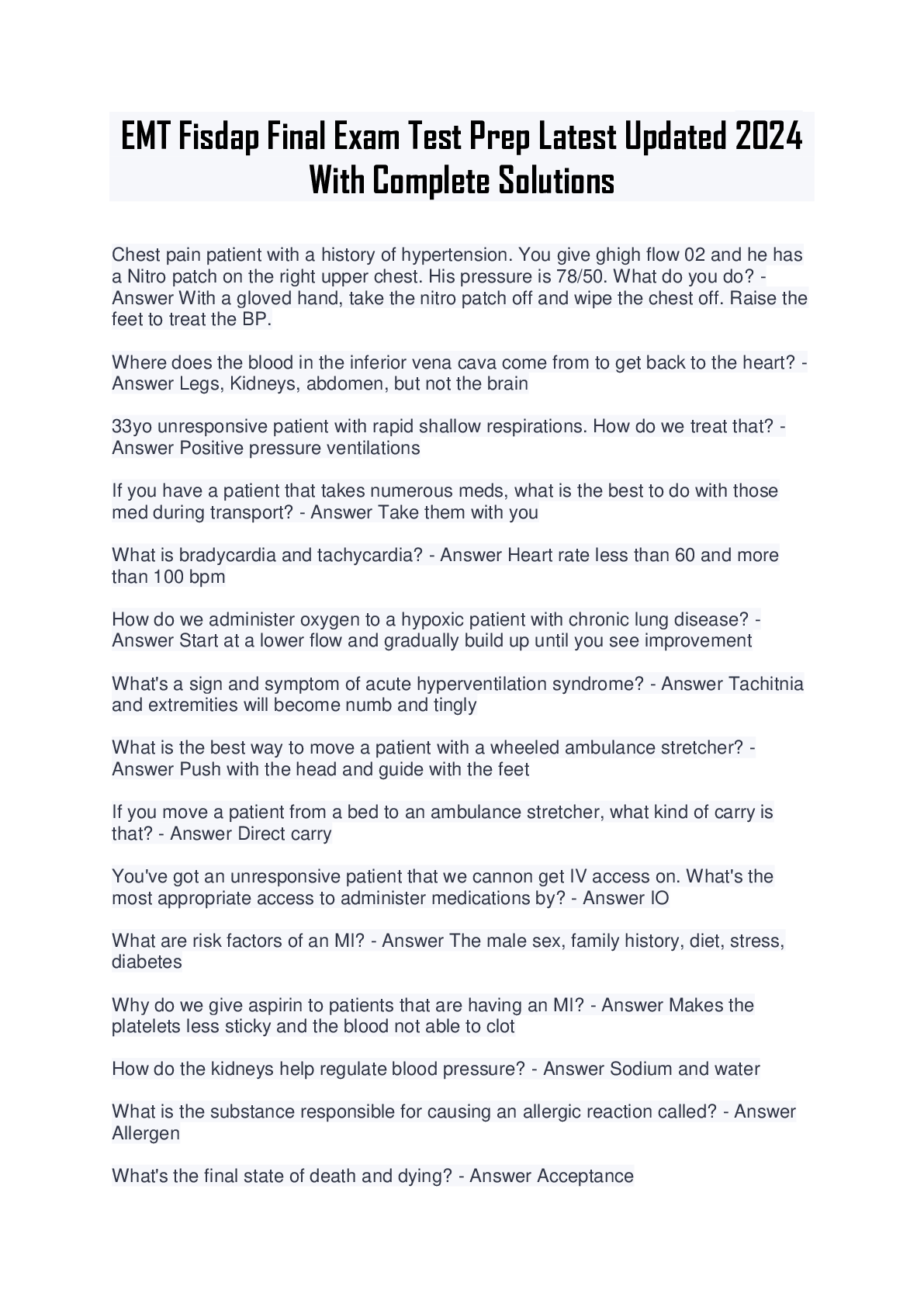Health Care > EXAM > ICH GCP for CCRC Exam Prep Latest Updated Graded A+ (All)
ICH GCP for CCRC Exam Prep Latest Updated Graded A+
Document Content and Description Below
Adverse Drug Reaction (ADR) - ANSWER All noxious and unintended responses to a medicinal product related to any dose E6(R1) 1 - ANSWER Glossary of terms Adverse Event (AE) - ANSWER Any untoward ... medical occurrence in a patient or clinical investigation subject administered a pharmaceutical product and which does not necessarily have a causal relationship with this treatment--any unfavorable and unintended sign , symptom, or disease temporally associated with the use of a medicinal product, whether or not related to the medicinal product Applicable Regulatory Requirements - ANSWER Any law(s) and regulation(s) addressing the conduct of clinical trials of investigational products Institutional Review Board Approval - ANSWER The affirmative decision of the IRB that the clinical trial has been reviewed and may be conducted at the institution site within the constraints set forth by the IRB, the institution, Good Clinical Practice (GCP), and the applicable regulatory requirements Audit - ANSWER A systematic and independent examination of trial related activities and documents to determine whether the evaluated trial related activities were conducted, and the data were recorded, analyzed and accurately reported according to the protocol, sponsor's standard operating procedures, (SOPs), Good Clinical Practice (GCP), and the applicable regulatory requirement(s) Audit Certificate - ANSWER A declaration of confirmation by the auditor that an audit has taken place Audit Report - ANSWER A written evaluation by the sponsor's auditor of the results of the audit Audit Trail - ANSWER Documentation that allows reconstruction of the course of events Blinding/Masking - ANSWER A procedure in which one or more parties to the trial are kept unaware of the treatment assignment(s). Case Report Form (CRF) - ANSWER A printed, optical, or electronic document designed to record all of the protocol required information to be reported to the sponsor on each trial subject. Clinical Trial/Study - ANSWER Any investigation in human subjects intended to discover or verify the clinical, pharmacological and/or other pharmacodynamic effects of an investigational product(s), and/or to identify any adverse reactions to an investigational product(s), and/or to study absorption, distribution, metabolism, and excretion of an investigational product(s) with the object of ascertaining its safety and/or efficacy Clinical Trial/Study Report - ANSWER A written description of a trial/study of any therapeutic, prophylactic, or diagnostic agent conducted in human subjects, in which the clinical and statistical description, presentations, and analyses are fully integrated into a single report Comparator (Product) - ANSWER An investigational or marketed product, or placebo, used as a reference in a clinical trial. Compliance to Trials - ANSWER Adherence to all the trial-related requirements, Good Clinical Practice (GCP) requirements, and the applicable regulatory requirements Confidentiality - ANSWER Prevention of disclosure, to other than authorized individuals, of a sponsor's proprietary information or of a subject's identity. Contract - ANSWER A written, dated, and signed agreement between two or more involved parties that sets out any arrangements on delegation and distribution of tasks and obligations and, if appropriate, on financial matters. Coordinating Committee - ANSWER A committee that a sponsor may organize to coordinate the conduct of a multicenter trial. Coordinating Ivestigator - ANSWER An investigator assigned the responsibility for the coordination of investigators at different centers participating in a multicenter trial Contract Research Organization (CRO) - ANSWER A person or an organization (commercial, academic, or other) contracted by the sponsor to perform one or more of a sponsor's trial-related duties and functions. Direct Access - ANSWER Permission to examine, analyze, verify, and reproduce any records and reports that are important to evaluation of a clinical trial Documentation - ANSWER All records, in any form that describe or record the methods, conduct, and/or results of a trial, the factors affecting a trial, and the actions taken Essential Documents - ANSWER Documents which individually and collectively permit evaluation of the conduct of a study and the quality of the data produced Good Clinical Practice (GCP) - ANSWER A standard for the design, conduct, performance, monitoring, auditing, recording, analyses, and reporting of clinical trials that provides assurance that the data and reported results are credible and accurate, and that the rights, integrity, and confidentiality of trial subjects are protected Independent Data-Monitoring Committee (IDMC) (Data and Safety Monitoring Board, Monitoring Committee, Data Monitoring Committee) - ANSWER An independent data-monitoring committee that may be established by the sponsor to assess at intervals the progress of a clinical trial, the safety data, and the critical efficacy endpoints, and to recommend to the sponsor whether to continue, modify, or stop a trial Impartial Witness - ANSWER A person, who is independent of the trial, who cannot be unfairly influenced by people involved with the trial, who attends the informed consent process if the subject or the subject's legally acceptable representative cannot read, and who reads the informed consent form and any other written information supplied to the subject Independent Ethics Committee (IEC) - ANSWER An independent body constituted of medical professionals and non-medical members, whose responsibility it is to ensure the protection of the rights, safety and well-being of human subjects involved in a trial and to provide public assurance of that protection, by, among other things, reviewing and approving / providing favorable opinion on, the trial protocol, the suitability of the investigator(s), facilities, and the methods and material to be used in obtaining and documenting informed consent of the trial subjects. Informed Consent - ANSWER A process by which a subject voluntarily confirms his or her willingness to participate in a particular trial, after having been informed of all aspects of the trial that are relevant to the subject's decision to participate--documented by means of a written, signed and dated informed consent form Inspection - ANSWER The act by a regulatory authority of conducting an official review of documents, facilities, records, and any other resources that are deemed by the authorities to be related to the clinical trial and that may be located at the site of the trial, at the sponsor's and/or contract research organization's (CRO's) facilities, or at other establishments deemed appropriate by the regulatory authorities Institution (Medical) - ANSWER Any public or private entity or agency or medical or dental facility where clinical trials are conducted Institutional Review Board (IRB) - ANSWER An independent body constituted of medical, scientific, and non-scientific members, whose responsibility is to ensure the protection of the rights, safety, and well-being of human subjects involved in a trial by, among other things, reviewing, approving, and providing continuing review of trial protocol and amendments and of the methods and material to be used in obtaining and documenting informed consent of the trial subjects Interim Clinical Trial/Study Report - ANSWER A report of intermediate results and their evaluation based on analyses performed during the course of a trial Investigational Product - ANSWER A pharmaceutical form of an active ingredient or placebo being tested or used as a reference in a clinical trial, including a product with a marketing authorization when used or assembled (formulated or packaged) in a way different from the approved form, or when used for an unapproved indication, or when used to gain further information about an approved use. Investigator - ANSWER A person responsible for the conduct of the clinical trial at a trial site. Investigator's Brochure - ANSWER A compilation of the clinical and nonclinical data on the investigational product(s) which is relevant to the study of the investigational product(s) in human subjects. Legally Acceptable Representative - ANSWER An individual or juridical or other body authorized under applicable law to consent, on behalf of a prospective subject, to the subject's participation in the clinical trial. Monitoring - ANSWER The act of overseeing the progress of a clinical trial, and of ensuring that it is conducted, recorded, and reported in accordance with the protocol, Standard Operating Procedures (SOPs), Good Clinical Practice (GCP), and the applicable regulatory requirement(s). Monitoring Report - ANSWER A written report from the monitor to the sponsor after each site visit and/or other trial-related communication according to the sponsor's SOPs. Multicenter Trial - ANSWER A clinical trial conducted according to a single protocol but at more than one site, and therefore, carried out by more than one investigator Nonclinical Study - ANSWER Biomedical studies not performed on human subjects IEC Opinion - ANSWER The judgement and/or the advice provided by an Independent Ethics Committee (IEC) Protocol - ANSWER A document that describes the objective(s), design, methodology, statistical considerations, and organization of a trial. Protocol Amendment - ANSWER A written description of a change to or formal clarification of a protocol. Quality Assurance (QA) - ANSWER All those planned and systematic actions that are established to ensure that the trial is performed ad the data are generated, documented, and reported in compliance with GCP and the applicable regulatory requirements Quality Control (QC) - ANSWER The operational techniques and activities undertaken within the quality assurance system to verify that the requirements for quality of the trial-related activities have been fulfilled Randomization - ANSWER The process of assigning trial subjects to treatment or control groups using an element of chance to determine the assignments in order to reduce bias. Regulatory Authorities - ANSWER Bodies having the power to regulate. Serious Adverse Event (SAE) or Serious Adverse Drug Reaction (Serious ADR) - ANSWER Any untoward medical occurrence that at any dose: -results in death -is life-threatening -requires inpatient hospitalization or prolongation of existing hospitalization -results in persistent or significant disability/incapacity -is a congenital anomaly/birth defect Source Data - ANSWER All information in original records and certified copies of original records of clinical findings, observations, or other activities in a clinical trial necessary for the reconstruction and evaluation of the trial Source Documents - ANSWER Original documents, data, and records. Sponsor - ANSWER An individual, company, institution, or organization which takes responsibility for the initiation, management, and/or financing of a clinical trial Sponsor-Investigator - ANSWER An individual who both initiates and conducts, alone or with others, a clinical trial, and under whose immediate direction the investigational product is administered to, dispensed to, or used by a subject. Standard Operating Procedures (SOPs) - ANSWER Detailed, written instructions to achieve uniformity of the performance of a specific function Subinvestigator - ANSWER Any individual member of the clinical trial team designated and supervised by the investigator at a trial site to perform critical trial-related procedures and/or to make important trial-related decisions. Subject/Trial Subject - ANSWER An individual who participates in a clinical trial, either as a recipient of the investigational product(s) or as a control Subject Identification Code - ANSWER A unique identifier assigned by the investigator to each trial subject to protect the subject's identity and used in lieu of the subject's name when the investigator reports adverse events and/or other trial related data Trial Site - ANSWER The location(s) where trial-related activities are actually conducted Unexpected Adverse Drug Reaction - ANSWER An adverse reaction, the nature or severity of which is not consistent with the applicable product information. Vulnerable Subject - ANSWER Individuals whose willingness to volunteer in a clinical trial may be unduly influenced by the expectation, whether justified or not, or benefits associated with participation, or of a retaliatory response from senior members of a hierarchy in case of refusal to participate. Well-being (of the trial subjects) - ANSWER The physical and mental integrity of the subjects participating in a clinical trial E6(R1) 2 - ANSWER The Principles of ICH GCP E6(R1) 2.1 - ANSWER Clinical trials should be conducted in accordance with the ethical principles that have their origin in the Declaration of Helsinki, and that are consistent with GCP and the applicable regulatory requirement(s) E6(R1) 2.2 - ANSWER Before a trial is initiated, foreseeable risks and inconveniences should be weighed against the anticipated benefit for the individual trial subject and society. A trial should be initiated and continued only if the anticipated benefits justify the risks. E6(R1) 2.3 - ANSWER The rights, safety, and well-being of the trial subjects are the most important considerations and should prevail over interests of science and society. E6(R1) 2.4 - ANSWER The available nonclinical and clinical information on an investigational product should be adequate to support the proposed clinical trial. E6(R1) 2.5 - ANSWER Clinical trials should be scientifically sound, and described in a clear detailed protocol. E6(R1) 2.6 - ANSWER A trial should be conducted in compliance with the protocol that has received prior institutional review board (IRB) approval/favorable opinion. E6(R1) 2.7 - ANSWER The medical care given to, and medical decisions made on behalf of, subjects should always be the responsibility of a qualified physician or, when appropriate, of a qualified dentist. E6(R1) 2.8 - ANSWER Each individual involved in conducting a trial should be qualified by eduction, training, and experience to perform his or her respective task(s). E6(R1) 2.9 - ANSWER Freely given informed consent should be obtained from every subject prior to clinical trial participation E6(R1) 2.10 - ANSWER All clinical trial information should be recorded, handled, and stored in a way that allows its accurate reporting interpretation and verification. E6(R1) 2.11 - ANSWER The confidentiality of records that could identify subjects should be protected, respecting the privacy and confidentiality rules in accordance with the applicable regulatory requirement(s). E6(R1) 2.12 - ANSWER Investigational products should be manufactured, handled, and stored in accordance with applicable good manufacturing practice (GMP). They should be used in accordance with the approved protocol. E6(R1) 2.13 - ANSWER Systems with procedures that assure the quality of every aspect of the trial should be implemented. E6(R1) 3.1 - ANSWER Institutional Review Board/Independent Ethics Committee (IRB/IEC)--Responsibilities E6(R1) 3.2 - ANSWER Institutional Review Board/Independent Ethics Committee (IRB/IEC)--Composition, Functions and Operations E6(R1) 3.3 - ANSWER Institutional Review Board/Independent Ethics Committee (IRB/IEC)--Procedures -The IRB/IEC should establish, document in writing, and follow its procedures E6(R1) 3.4 - ANSWER Institutional Review Board/Independent Ethics Committee (IRB/IEC)--Records -The IRB/IEC should retain all relevant records for a period of at least 3 years after completion of the trial and make them available upon request from the regulatory authorities E6(R1) 3.1.1 - ANSWER An IRB/IEC should safeguard the rights, safety, and well-being of all trial subjects. Special attention should be paid to trials that may include vulnerable subjects E6(R1) 3.1.2 - ANSWER The IRB/IEC should obtain the following documents: trial protocols/amendments, written informed consent forms and consent form updates that the investigator proposes for use in the trial, subject recruitment procedures, written information to be provided to subjects, Investigator's Brochure, available safety information, information about payments, and compensation available to subjects, the investigator's current curriculum vitae and/or other documentation evidencing qualifications, and any other documents that the IRB/IEC may need to fulfill its responsibilities. E6(R1) 3.1.3 - ANSWER The IRB/IEC should consider the qualifications of the investigator for the proposed trial, as documented by a current curriculum vitae and/or by any other relevant documentation the IRB/IEC requests E6(R1) 3.1.4 - ANSWER The IRB/IEC should conduct continuing review of each ongoing trial at intervals appropriate to the degree of risk to human subjects, but at least once per year E6(R1) 3.1.5 - ANSWER The IRB/IEC may request more information than is outlined in paragraph 4.8.10 be given to subjects when, in the judgement of the IRB/IEC, the additional information would add meaningfully to the protection of the rights, safety and/or well-being of the subjects. E6(R1) 3.1.6 - ANSWER When a non-therapeutic trial is to be carried out with the consent of the subject's legally acceptable representative, the IRB/IEC should determine that the proposed protocol and/or other documents adequately addresses relevant ethical concerns and meets applicable regulatory requirements for such trials E6(R1) 3.1.7 - ANSWER Where the protocol indicates that prior consent of the trial subject or the subject's legally acceptable representative is not possible, the IRB/IEC should determine that the proposed protocol and/or other documents adequately addresses relevant ethical concerns and meets applicable regulatory requirements for such trials E6(R1) 3.1.8 - ANSWER The IRB/IEC should review both the amount and method of payment to subjects to assure that neither presents problems of coercion or undue influence on the trial subjects. Payments to a subject should be prorated and not wholly contingent on completion of the trial by the subject. E6(R1) 3.1.9 - ANSWER The IRB/IEC should ensure that information regarding payment to subjects, including the methods, amounts, and schedule of payment to trial subjects, is set forth in the written informed consent form and any other written information to be provided to subjects. The way payment will be prorated should be specified. E6(R1) 3.2.1 - ANSWER The IRB/IEC should consist of a reasonable number of members, who collectively have the qualifications and experience to review and evaluate the science, medical aspects, and ethics of the proposed trial. It is recommended that the IRB/IEC should include: a) at least five members b) at least one member whose primary area of interest is in a nonscientific area c) at least one member who is independent of the institution/trial site. Only those IRB/IEC members who are independent of the investigator and the sponsor of the trial should vote/provide opinion on a trial-related matter. A list of IRB/IEC members and their qualifications should be maintained. E6(R1) 3.2.2 - ANSWER The IRB/IEC should perform its functions according to written operating procedures, should maintain written records of its activities and minutes of its meetings, and should comply with GCP and with the applicable regulatory requirements E6(R1) 3.2.3 - ANSWER An IRB/IEC should make its decisions at announced meetings at which at least a quorum, as stipulated in its written operating procedures, is present E6(R1) 3.2.4 - ANSWER Only members who participate in the IRB/IEC review and discussion should vote/provide their opinion and/or advise E6(R1) 3.2.5 - ANSWER The investigator may provide information on any aspect of the trial, but should not participate in the deliberations of the IRB/IEC or in the vote/opinion of the IRB/IEC E6(R1) 3.2.6 - ANSWER An IRB/IEC may invite nonmembers with expertise in special areas for assistance E6(R1) 3.3.1 - ANSWER Determining its composition(names and qualifications of the members) and the authority under which it is established E6(R1) 3.3.2 - ANSWER Scheduling, notifying its members of, and conducting its meetings. E6(R1) 3.3.3 - ANSWER Conducting initial and continuing review of trials. E6(R1) 3.3.4 - ANSWER Determining the frequency of continuing review, as appropriate. E6(R1) 3.3.5 - ANSWER Providing, according to the applicable regulatory requirements, expedited review and approval/favorable opinion of minor changes in ongoing trials that have the approval/favorable opinion of the IRB/IEC. E6(R1) 3.3.6 - ANSWER Specifying that no subject should be admitted to a trial before the IRB/IEC issues its written approval/favorable opinion of the trial E6(R1) 3.3.7 - ANSWER Specifying that no deviations from, or changes of, the protocol should be initiated without prior written IRB/IEC approval/favorable opinion of an appropriate amendment, except when necessary eliminate immediate hazards to the subjects or when the changes involves only logistical or administrative aspects to the trial. E6(R1) 3.3.8 - ANSWER Specifying that the investigator should promptly repot to the IRB/IEC a) deviations from, or changes of, the protocol to eliminate immediate hazards to the trial subjects b) changes increasing the risk to subjects and/or affecting significantly the conduct of the trail c) all adverse drug reactions (ADRs) that are both serious ad unexpected [Show More]
Last updated: 2 years ago
Preview 1 out of 61 pages

Buy this document to get the full access instantly
Instant Download Access after purchase
Buy NowInstant download
We Accept:

Reviews( 0 )
$11.00
Can't find what you want? Try our AI powered Search
Document information
Connected school, study & course
About the document
Uploaded On
Sep 30, 2022
Number of pages
61
Written in
Additional information
This document has been written for:
Uploaded
Sep 30, 2022
Downloads
0
Views
78



